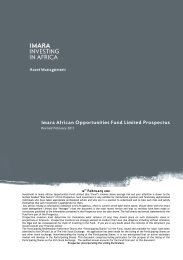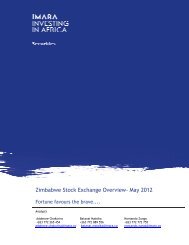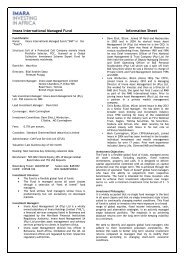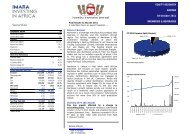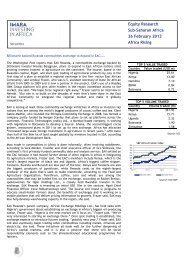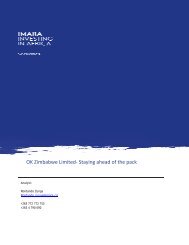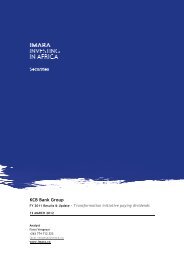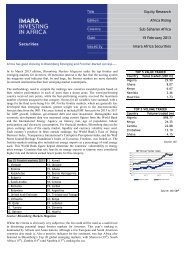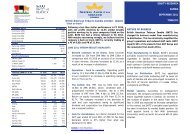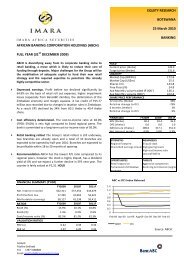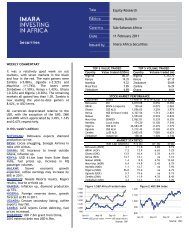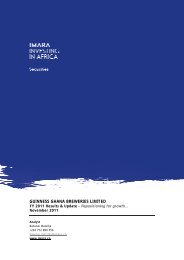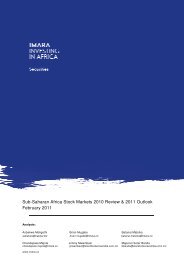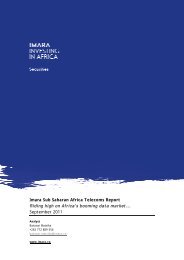Nigeria Banking Sector Coverage - December 2011 'Bad ... - Imara
Nigeria Banking Sector Coverage - December 2011 'Bad ... - Imara
Nigeria Banking Sector Coverage - December 2011 'Bad ... - Imara
Create successful ePaper yourself
Turn your PDF publications into a flip-book with our unique Google optimized e-Paper software.
<strong>Nigeria</strong> <strong>Banking</strong> <strong>Sector</strong> Overview<br />
Having undergone a major recapitalisation in 2005, where<br />
new minimum capital requirements of NGN 25bn led to the<br />
number of banks in <strong>Nigeria</strong> reduced to 25 from 89 through<br />
regulatory mergers and acquisition and later to 24 through<br />
market-induced merger and acquisition, <strong>Nigeria</strong>’s banking<br />
sector was supposed to be sound and well poised for the<br />
growth that its under banked retail market would provide<br />
with bank branches growing from 2,900 in 2005 to almost<br />
5,500 in mid-2009. Indeed, all seemed well, until the GFC<br />
hit in 2008, and the sector’s shiny coat began to unravel.<br />
As noted by the current CBN Governor in a public lecture in<br />
<strong>December</strong> 2010, the GFC affected <strong>Nigeria</strong> through both the<br />
financial and real (trade, remittances and aid) channels.<br />
The undiversified nature of the <strong>Nigeria</strong>n economy and the<br />
high dependence on exports of crude oil as well as foreign<br />
capital inflows compounded the impact of the external<br />
shock arising from the crisis, as <strong>Nigeria</strong> experienced low<br />
demand for its oil export due to recession in the economies<br />
of her major trading partners. This, coupled with the<br />
collapse in the international price of oil, led to severe<br />
decline in foreign exchange receipts and consequently,<br />
government revenue contraction. There was a substantial<br />
decline in foreign capital inflows just as foreign trade<br />
finance reduced significantly for some banks while for<br />
others credit lines literally dried-up.<br />
The greatest impact was, however, felt in the capital<br />
markets. The excess liquidity that had hitherto found its<br />
way into the stock market in the heydays of 2006/2007,<br />
which had also allowed banks to raise capital, had led to<br />
many of <strong>Nigeria</strong>’s bank’s being overcapitalised. The increase<br />
in capital supported banks’ balance sheet growth with<br />
banking sector assets as percentage of GDP increasing<br />
rapidly to 60% from about 30% in 2004. Struggling to<br />
profitably deploy all of this capital (most banks actually<br />
took in more capital than they had sought to raise as the<br />
NSE allowed this at the time in the event of<br />
oversubscriptions), banks were under pressure to create risk<br />
asset amidst limited product innovation and diversification.<br />
This, the CBN notes, coupled with poor risk management,<br />
led to a concentration of assets in certain areas, in<br />
particular margin lending and oil trading/marketing. As at<br />
end-<strong>December</strong> 2008, banks’ total exposure to the oil<br />
industry stood at over NGN 754bn, representing over 10% of<br />
the industry total and over 27% of shareholders’ funds.<br />
Thus, as foreign investors began to pull their funds out of<br />
the market, looking to reduce their exposure to “riskier”<br />
emerging and frontier markets, further exacerbating<br />
investor negativity due to the waning economy, panic selling<br />
by domestic investors followed. The capital market<br />
downturn had a negative impact on bank balance sheet<br />
through increased provisioning for bad debts and lower<br />
profitability. The result was a sharp deterioration in the<br />
quality of bank assets which then led to concerns over<br />
banking sector liquidity.<br />
Concerned about the state of some of the <strong>Nigeria</strong>n<br />
banks and the overall stability of the financial<br />
system, the Central Bank of <strong>Nigeria</strong> (CBN),<br />
commissioned special examinations on all 24 banks<br />
in <strong>Nigeria</strong>. These examinations highlighted<br />
significant deficiencies in capital adequacy and<br />
liquidity requirements, and illustrated major<br />
weaknesses in corporate governance and risk<br />
management practices. Ten banks were adjudged<br />
to be in grave states with deficiencies in capital<br />
adequacy i.e.: Oceanic Bank, Union Bank of<br />
<strong>Nigeria</strong>, Intercontinental Bank, Bank PHB, Afribank<br />
<strong>Nigeria</strong>, Finbank, Equitorial Trust Bank, Spring<br />
Bank and Wema Bank Plc. The tenth bank, Unity<br />
Bank, was not deemed to be in grave danger, but<br />
still adjudged to have insufficient capital and<br />
unacceptable levels of non-performing loans<br />
(NPLs). Of these, eight also had significant<br />
deficiencies in liquidity, risk management<br />
practices and corporate governance policies.<br />
Dec 2010<br />
Negative NAV (NGN bn)<br />
Oceanic Bank International<br />
<strong>Nigeria</strong> Plc (94 261)<br />
Union Bank of <strong>Nigeria</strong> Plc (135 894)<br />
Intercontinental Bank Plc (330 709)<br />
Bank PHB Plc (242 309)<br />
Afribank <strong>Nigeria</strong> Plc (260 940)<br />
Finbank Plc (104 751)<br />
Equitorial Trust Bank Ltd (27 253)<br />
Spring Bank Plc (87 869)<br />
Source: CBN<br />
The CBN took proactive steps, including the<br />
injection of NGN 620bn as a convertible loan that<br />
amounts to Tier II capital into the banks, replacing<br />
the Chief Executives and Executive Directors of<br />
eight of the banks with competent managers with<br />
experience and integrity, introducing the<br />
guarantee of the local interbank market to ensure<br />
continued liquidity for all banks and guaranteeing<br />
foreign creditors and correspondent banks’ credit<br />
lines to ensure confidence and maintain important<br />
correspondent banking relationships. The CBN also<br />
moved to create a “bad bank”, the Asset<br />
Management Corporation of <strong>Nigeria</strong> (AMCON). By<br />
31 <strong>December</strong> 2010, AMCON had executed loan<br />
purchase and service agreements with 21<br />
participating banks to acquire NPLs with a face<br />
value of NGN 2.04tn for just under NGN 800bn.<br />
92.5% of the purchased NPLs were from the 10<br />
“intervened” banks with the balance of 7.25%<br />
coming from other banks. AMCON issued 3-year<br />
zero coupon bonds with a yield of 10.125% as<br />
consideration for the purchased NPLs. This helped<br />
to further stabilise the banking sector.<br />
1



